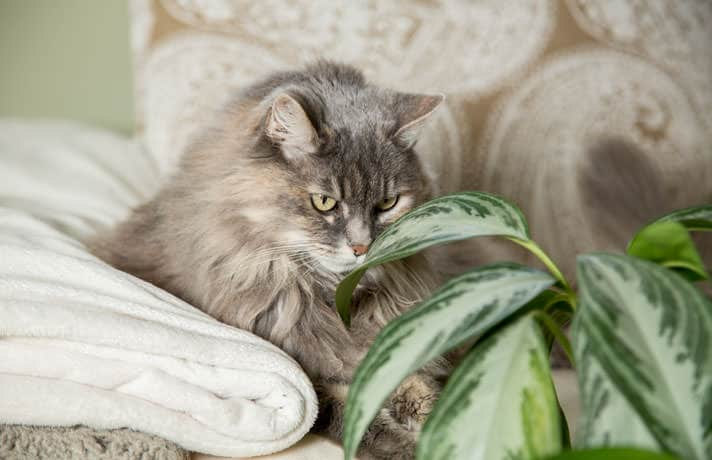Some indoor plants contain substances that are toxic to your cat (asparagus, cyclamen, poinsettia, philodendron…). That’s why it is advisable to keep them away.

On the other hand, you love your plants. So it’s a heartbreaker to see him scratching the soil with his sharp claws and nibbling the leaves (not to mention the cat who does his business every day in the middle of the garden’s plantings for a good marking). After all, even if your cat is king here, that’s no reason to damage your beloved plants. If you can’t do without either, here are some tips to avoid disaster.
It’s not much, but these pet-safe repellents can make a difference in keeping cats away. In the meantime, give your cat a box!
Rest assured: if the neighborhood cats often come to destroy your vegetable garden plantations and urinate on them, many repellent plants and natural solutions that are safe for the animal exist. Medicinal aromatic plants (peppermint, rosemary, etc.) can for example be planted to chase away the little undesirables that are harmful to the health of the garden. Make way for remedies!
Contents
1) Mustard water to prevent your cat from destroying your plants

Do you like mustard with your andouillette? Your cat does not. He prefers the andouillette alone. Why does he prefer it alone? Because it does not like mustard and does not support its odor which makes a true repellent for cat. So don’t hesitate to pour a tablespoon of mustard into a spray bottle containing 500 ml of warm water. Spray this mixture on the leaves of your plants to repel your feline. Remember to shake the bottle well before use on your scratch-prone flower pots.
2) Coffee grounds

As you know, coffee grounds are an excellent natural fertilizer. But what you may not know is that you could be doing double duty. Your cat has a weakness: he’s too clean. He often licks his paws… even more so when he walks in the grounds! He will then discover a very bitter unpleasant taste. Your cat is smart: if the experience is unpleasant once, he won’t come back.
3) Citrus peels to keep the cat away from plants

Cats can’t stand the strong repulsive odors of citrus peels (lemons, etc.). So place a few peels on the floor of your plant. As they decompose, they will give off a stronger scent that should keep Bibine and his powerful sense of smell at bay. In addition, you will fertilize the soil. A double hit. On the other hand, avoid using an essential oil (eucalyptus, lavender, lemongrass, etc.), as these essences are natural solutions that are toxic for felines.
4) Pepper

Don’t have mustard? Get some pepper. You’ve snorted pepper before, either out of curiosity or out of defiance. And you didn’t like it. Neither did your cat. So drop some ground black pepper on the ground. Then repeat the process to renew the effectiveness of the mixture. You can also spray pepper water as a very effective repellent. Another useful spice is cinnamon sticks, which can be planted in the ground to prevent your cat from accessing the plants!
5) Cactus and shells

This is a bit drastic, but it’s an effective solution. To keep Barney away from plants, you can also make it difficult for him to access them. The goal here isn’t to put rusty nails everywhere (you’re not like that), but you could lay out small cacti, large rocks, or pretty shells, for example. If dredging up your plants is an unpleasant experience, your cat will look the other way (Yes, his box).
Beware, remember that bleach is very popular with cats. So it’s best to avoid using it near your beloved plants, as it may attract them. For cleaning, prefer white vinegar, which repels them and acts as a good anti-saltpetre agent on pots. In addition, many of these natural products can be used on indoor and outdoor areas. It is also useful to keep away some of the stray cats and neighborhood cats that come to do their business in your plants. Your rose bushes, flower beds and lawn will thank you!
You can also create a natural cat repellent to spray in strategic places.

